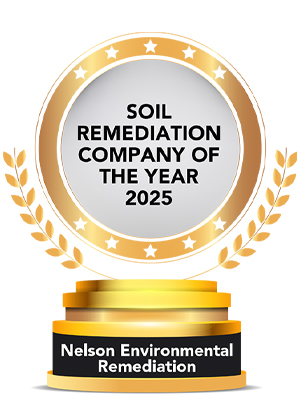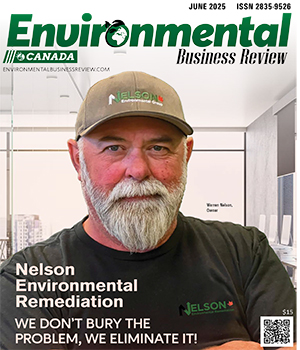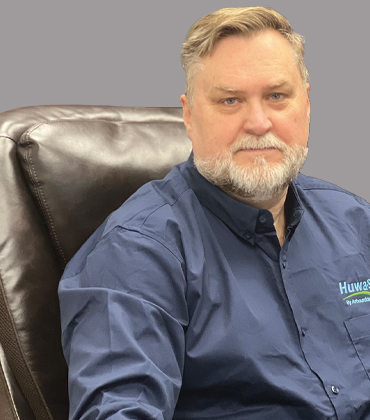Thank you for Subscribing to Environmental Business Review Weekly Brief
Environmental Business Review: Specials Magazine
But of sight is no longer out of mind when it comes to pollution. As industries face mounting pressure to reduce their environmental impact, conventional methods of containing contamination are proving insufficient. Nelson Environmental Remediation is pioneering a more sustainable approach, offering advanced remediation solutions that restore polluted sites and eliminate long-term liability for businesses. “Unlike traditional methods that haul toxic materials to landfill, where liability lingers indefinitely, we eliminate contamination at its source,” says Warren Nelson, owner. “We Don’t Just Bury the Problem—We Eliminate It”: The Nelson Guarantee At the heart of Nelson Environmental Remediation’s strategy is a commitment to complete contamination removal—an approach made possible through advanced thermal desorption technology. The company utlizes two primary methods to treat hazardous materials directly at the source Direct-Fired Thermal Desorption (DFTD), also known as Low-Temperature Desorption, heats contaminated soil, sludge, or sediment in a specialized thermal desorber, evaporating toxic compounds for safe destruction. In contrast, Indirect Thermal Desorption (ITD) utilizes an inclined rotating metallic cylinder, where heat is transferred through conduction, preventing direct contact between the flame, feed solids, or off-gas. By remediating soil on-site and verifying results through third-party testing, the company eliminates waste generators’ liability while ensuring regulatory compliance and environmental responsibility From Soil Remediation to Environmental Powerhouse Founded 30 years ago as a specialized soil remediation company, Nelson has evolved into a full-scale environmental solutions provider. It now addresses groundwater contamination, high-resolution site delineation, and industrial waste recycling— including tyres and plastics. The company has also developed techniques for tackling emerging contaminants like per- and poly-fluoroalkyl (PFAS) and dioxins. This evolution has expanded Nelson’s reach across multiple industries and regions. In South East Asia the company addresses dioxin contamination, a lasting consequence of wartime activities. In Europe, it partners with the steel industry to extract and recycle steel powder, demonstrating expertise beyond soil remediation. In the United States, Nelson has remediated chlorinated solvent spills in New York City and a gasoline pipeline rupture in Dallas. One of its most significant projects occurred in North Dakota, where it cleaned up 2 million tons of contaminated soil from a pipeline rupture over three years, operating 24/7. Whether in the Arctic at -50°F or tropical regions like Honolulu, Nelson has proven its ability to adapt to diverse conditions and regulatory frameworks. Meeting the Needs of Global Giants and Local Communities Alike Nelson Environmental Remediation serves many clients, including major oil and gas companies, government agencies, petrochemical firms, and environmental consulting groups. Among its latest partnerships is the Canadian Department of Defense, reflecting the company’s growing role in high-stakes environmental restoration projects. For industries seeking remediation solutions, safety and liability remain critical concerns. Traditional methods involve excavating contaminated soil and transporting it to landfills— an approach that demands thousands of truckloads, increases accident risks, raises carbon emissions, and extends long-term liability. Nelson eliminates these challenges through its on-site mobile technology, treating contamination directly at the source and ensuring a safer, more sustainable process.
Top Recycling and Waste Disposal Service in Canada 2025
Waste is an unavoidable byproduct of business operations, but what happens next makes all the difference. While landfilling may seem like the simplest solution, it comes with severe environmental consequences. Recycling is a far better option, but it often comes with challenges like contamination, complex sorting systems, and added disposal costs. Even when done right, recycling faces limitations such as fluctuating market demand and quality degradation. So, how can businesses make a real impact in waste reduction? The solution requires better waste management strategies, custom collection methods, improved sorting systems, and viable landfill alternatives. That’s where Waste Reduction Group (WRG) comes in. With over 25 years of experience in recycling and waste management, WRG offers a one-stop-shop for custom, end-to-end solutions that makes it easy for companies to recycle most of their generated waste. Guided by a simple philosophy of “recycle more, waste less,” it helps businesses seamlessly integrate recycling without added complexity or extra costs. Leveraging strategic relationships and a specialized fleet, the company aims to make recycling as cost-effective as disposal— and at times even cheaper. “We have the relationships, tools, and expertise to solve every waste problem. We look at each customer individually to design a system that works best for them, then maximize their impact on recycling and sustainability,” says Chris Hopper, VP of Growth and Finance at WRG. What sets WRG apart is its relentless commitment to transparency and accountability - across every aspect of the organization. Unlike most others in the industry, the company ensures all materials end up in the right place. This steadfast commitment to responsible waste management has earned the trust of organizations that value sustainability - including long-time client, the University of Toronto, which has been recognized as the Most Sustainable University in the World for two consecutive years. WRG offers a comprehensive range of waste management and recycling services, including customized collection and proper disposal, regulated waste audits, waste and recycling product sales, and industrial-strength mobile power washing and cleaning services.
Bio-Remediation Solutions Company of the Year in Canada 2025
Arbourdale redefines water treatment with chemical-free solutions that safeguard health, boost productivity, and protect the environment. From hospitals to farms and industry, its systems deliver clean, compliant water—eliminating risk and complexity while offering lasting peace of mind and a smarter path to sustainability.
CXO INSIGHTS

Integrating Innovation and Practicality for Sustainable Packaging Solutions
Julia Lodi, Procurement Specialist - Packaging, Nature’s Path

Redefining Environmental Management in Canadian Mining
Chris Gaspar, Environmental Manager, Barrick Mining Corporation (NYSE: GOLD)

The Transformative Journey to Green Energy
Rick Lehoux, Director of Central Engineering, Greenfield Global

Driving Operational Clarity and Cultural Change
Mary Forster, Director of Health & Safety, Kal Tire

Transforming Utility Challenges into Environmental Solutions
Emmanuel Quagraine, Manager of Chemical Initiatives and Services, SaskPower
IN FOCUS
EDITORIAL
Turning the Tide: The Business of Regeneration and Smart Sustainability
A clear example of this shift is bioremediation, now central to environmental restoration. By harnessing microbes, enzymes, and plants to neutralize toxins, techniques such as electro-bioremediation (utilizing electric currents to stimulate microbial activity) and phytoremediation (utilizing plant roots to extract and stabilize contaminants) are expanding possibilities. When combined with biosensors, IoT monitoring and AI-driven analytics, these methods achieve greater precision, enabling real-time tracking, predictive modeling and targeted interventions that minimize disruption and reduce long-term costs.
The convergence of environmental science and digital intelligence is also transforming waste management. As food waste emerges as a significant source of methane emissions, Canadian municipalities are banning its disposal in landfills, driving businesses to adopt sustainable solutions. Many are implementing on-site digesters and composters or collaborating with providers to convert waste into energy or byproducts. AI-driven sorting and smart collection systems are enhancing recycling, optimizing logistics, and reducing greenhouse gas emissions. This shift marks a move from reactive cleanup to proactive, regenerative systems that seamlessly integrate environmental responsibility into daily operations.
Driven by the trends, the environmental business market is projected to reach approximately $1054.29 billion by 2032, growing at a compound annual growth rate of 5.7 percent.
This Environmental Business Review Canada magazine brings thought leadership articles from Julia Lodi, Procurement Specialist - Packaging at Nature’s Path Foods, stressing the importance of informed adoption and ongoing education to ensure that sustainable packaging solutions are both practical and impactful. Additionally, Mariana Filipic, Senior Director of Global Quality, at Mold-Masters, highlights how a commitment to quality is reshaping the future of the plastic industry, outlining key drivers behind quality-driven excellence from strategic leadership and customer-centric design to global standards, manufacturing precision and sustainability.
This edition also features the Bio-Remediation Solutions Company of the Year in Canada 2025, Soil Remediation Company of the Year in Canada 2025 and Top Recycling and Waste Disposal Service in Canada 2025. We hope you find the right partner to meet your organization’s needs. Let us know your thoughts!







